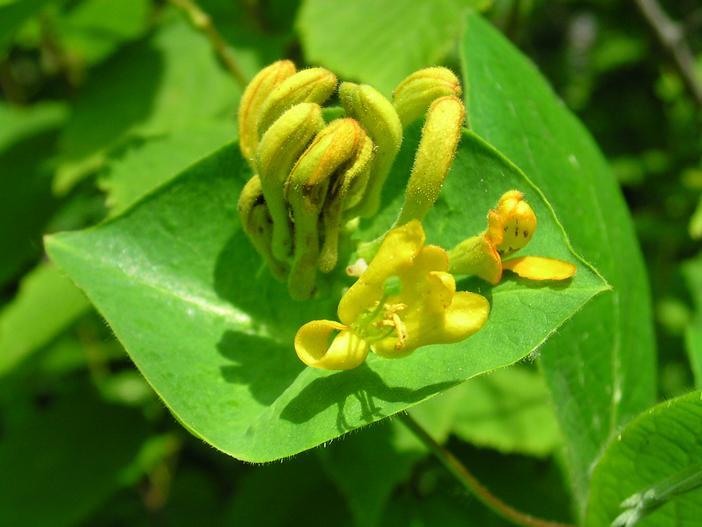Hairy Honeysuckle
(Lonicera hirsuta)
Hairy Honeysuckle (Lonicera hirsuta)
/
/

Superior National Forest
CC BY 2.0
Image By:
Superior National Forest
Recorded By:
Copyright:
CC BY 2.0
Copyright Notice:
Photo by: Superior National Forest | License Type: CC BY 2.0 | License URL: https://creativecommons.org/licenses/by/2.0/ | Uploader: Superior National Forest | Publisher: Flickr


























































Estimated Native Range
Summary
Lonicera hirsuta, commonly known as Hairy Honeysuckle, is a deciduous perennial vine native to the understory of cool, moist forests and along the edges of clearings in the Northeastern USA and Eastern Canada. It can climb to heights of 10-15 feet (3-4.6 meters) and spread equally wide. The vine is characterized by its hairy stems and leaves, which give it its common name. The flowers are tubular, with a two-lipped appearance, transitioning from yellow to orange as they mature, and are typically in bloom from late spring to mid-summer. These blossoms are moderately showy and can attract hummingbirds and butterflies.
Hairy Honeysuckle is valued for its ability to thrive in a variety of conditions, including urban environments where air pollution may be a concern. It is often used for naturalizing in woodland gardens, as a climbing vine on trellises, or allowed to sprawl as a ground cover. While adaptable to different soil types, it prefers moist, well-drained soils and can tolerate both part shade and full sun. Gardeners should be aware that it can become aggressive if not managed properly, potentially outcompeting other plants in the garden.CC BY-SA 4.0
Hairy Honeysuckle is valued for its ability to thrive in a variety of conditions, including urban environments where air pollution may be a concern. It is often used for naturalizing in woodland gardens, as a climbing vine on trellises, or allowed to sprawl as a ground cover. While adaptable to different soil types, it prefers moist, well-drained soils and can tolerate both part shade and full sun. Gardeners should be aware that it can become aggressive if not managed properly, potentially outcompeting other plants in the garden.CC BY-SA 4.0
Plant Description
- Plant Type: Vine
- Height: 10-15 feet
- Width: 10-15 feet
- Growth Rate: Slow
- Flower Color: Yellow, Orange
- Flowering Season: Summer
- Leaf Retention: Deciduous
Growth Requirements
- Sun: Part Shade, Full Sun
- Water: Medium
- Drainage: Fast
Common Uses
Bee Garden, Bird Garden, Butterfly Garden, Fragrant, Hummingbird Garden, Low Maintenance, Showy Flowers
Natural Habitat
Understory of cool, moist forests and along the edges of clearings
Other Names
Common Names:
Scientific Names: , Lonicera hirsuta, Lonicera villosa, Lonicera hirsuta var. schindleri, Lonicera pubescens, Lonicera goldii, Lonicera hirsuta var. interior, Caprifolium pubescens, Lonicera douglasii, Lonicera hirsuta var. hirsuta
GBIF Accepted Name: Lonicera hirsuta Eaton